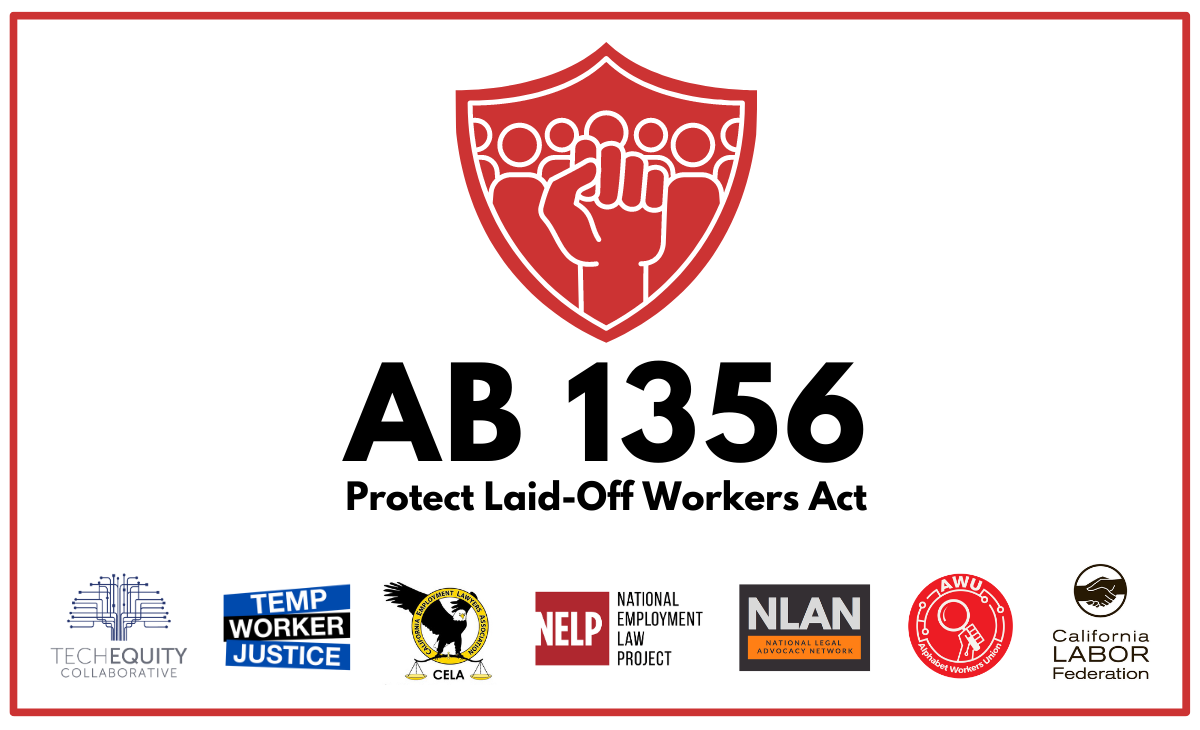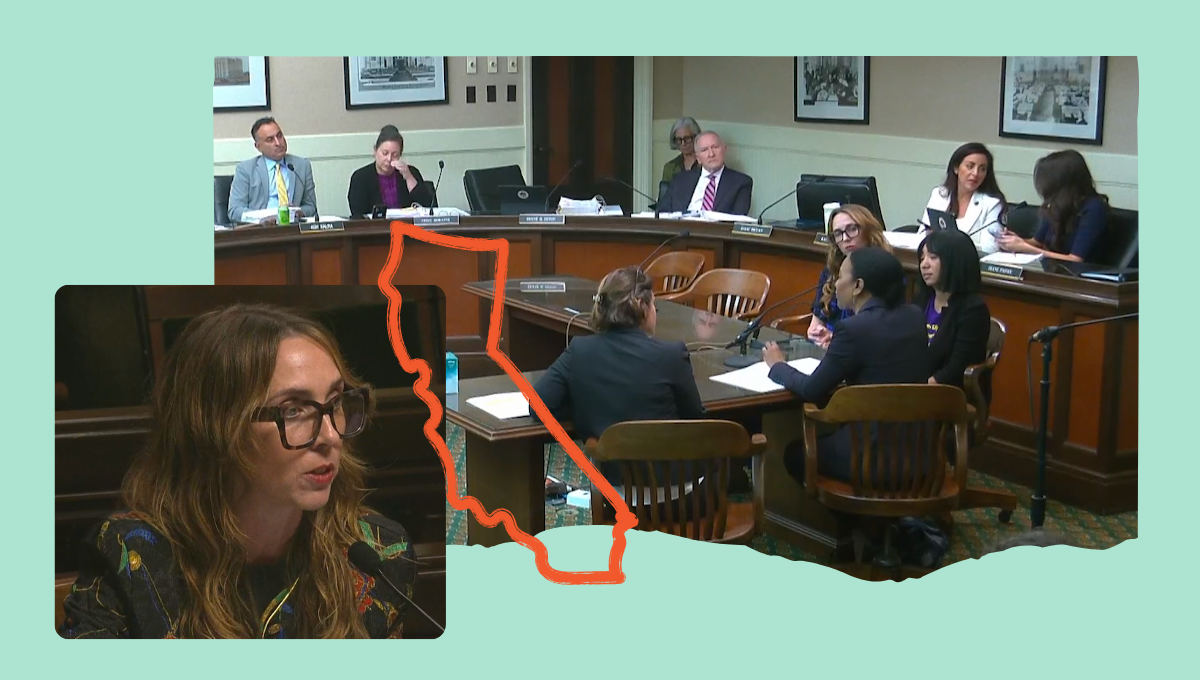Assemblymember Haney Introduces Bill to Expand WARN Act Protections

Legislative proposal would ensure that more workers in California are protected and have access to an economic safety net when companies conduct mass layoffs.
SACRAMENTO— Today Assemblymember Matt Haney (D-San Francisco) announced AB 1356, the Protect Laid Off Workers Act, expanding the California Worker Adjustment and Retraining Notification (WARN) Act to include contract workers and strengthen existing protections for all laid-off workers. Sponsored by TechEquity Collaborative, California Labor Federation, National Employment Law Project, Temp Worker Justice, National Legal Advocacy Network, California Employment Lawyers Association, and Alphabet Workers Union-CWA, the proposed legislation will expand labor rights to over 1.9 million contract workers and increase the economic protections for over 5 million workers in California.
“Innovative industries like tech are a critical part of our state’s economy, and we know that tech companies start here and grow here because of our highly skilled workforce,” said Assemblymember Haney, District 17. “This bill is about protecting that workforce, from the engineers to the janitors, and making sure they’re treated fairly during a job transition. If we don’t take care of our tech workers then we’ll lose one of California’s greatest resources to states like Texas, Washington, or New York.”
“We respect that downsizing is sometimes an unavoidable part of business. But discarding employees that have done nothing wrong, with little to no notice, isn’t right and it hurts the competitiveness of our state’s tech industry,” said Haney. “If our workers are given notice and have enough time to look for other work, they’re more likely to stay here in California. AB 1356 closes the gaping loopholes in critical layoff protection laws and gives contract workers the basic protections that all workers at these large companies deserve.”
More than a third of Californians don’t have enough money saved to cover basic necessities for more than three months. The Protect Laid Off Workers Act would increase the economic safety net available to laid-off workers by providing a 90 days notice requirement. This legislation will expand these benefits to over 1.9 million contract workers who are impacted by a mass layoff. Finally, the legislation would ensure that companies decouple severance negotiations from meeting their obligations to the California WARN Act.
Since the start of 2022, the tech industry has announced the elimination of more than 200,000 jobs, including reductions in staff at nearly all of the Big Tech companies. Twitter notably laid off 4,400 of their 5,500 contract workers without notice or severance.
Research conducted by TechEquity Collaborative also found that contract workers—disproportionately Black, Indigenous, Latinx, Asian, women, and nonbinary people—within the tech sector are among the most vulnerable workers in the industry. In addition to routinely receiving fewer benefits and less pay for the same responsibilities as their directly-employed counterparts, contract workers of color are less likely to be converted to permanent, direct employment than white contract workers. The disparities persist across job types and positions from security guards to engineers; janitors to web developers.
“California needs guardrails to ensure workers are protected in the event of a layoff—and those guardrails should reflect the realities that working people experience today. We thank Assemblymember Matt Haney for introducing the bill, his leadership, and his partnership with workers and advocates throughout this process,” said Catherine Bracy, CEO and Co-Founder of TechEquity Collaborative. “The Protect Laid Off Workers Act is necessary to provide workers the safety net needed after a layoff—especially for marginalized (and underpaid) contract workers. When we pass policies to address deep inequities, we all benefit.”
“The full-time employees at Twitter were sent an email saying “if you’re still at the company you’ll get your new assignment, if you’re not you’ll get your severance package information. I didn’t get that email. None of the other contract workers got that email,” said Melissa Ingle, a former contract worker at Twitter. “On Saturday, November 12th, I was at the mall with my daughter and her friend. I got a notification on my phone that said one or more of your access tokens have been revoked. I tried to open my Twitter email and my Slack, and got a notice that said ‘no such user exists.’ That’s how I was told that I was fired. Nobody explained anything to me, I got no email, I was just cut off.”
“I worked at Twitter for 9 years until one day I walked in and they told me my role was no longer needed at the company,” said Martin Cerdaguido, a former janitor at Twitter headquarters. “This was a few weeks before the holidays. I got no explanation of why I was suddenly laid off and still haven’t been able to fully recover.”
“One of the worst parts of the contract work structure is a lack of severance and a lack of forms of compensation that last after being fired, like 401k, vested stock options, etc. that directly-employed workers get,” said David Jones-Krause, former contract worker at Google and member of Alphabet Workers Union-CWA. “Even if they are fired, they’re leaving with all those things—we’re not.”
“For too long, tech billionaires have behaved as though labor laws don’t apply to them. They outsource to misclassified workers and contractors to avoid accountability. Now we see those companies doing mass layoffs even as they take in record profits,” said Lorena Gonzalez Fletcher, Executive Secretary-Treasurer of the California Labor Federation. “We are proud to stand with the workers—from engineers to janitors—as co-sponsors of AB 1356 which will strengthen layoff protection for workers and contractors.”
“Contract workers are generally making lower wages and have less access to benefits like healthcare; with the layoffs, people are losing what little they have,” said Roberto Clack, Executive Director of Temp Worker Justice. “It’s important that we extend protections for laid-off workers—and it’s critical to ensure that contract workers are a part of that.”
“As mass layoffs continue, it is imperative that every worker, whether directly-employed or contracted, gets the support they need to endure the economic shock of a layoff,” said Mariko Yoshihara, Policy Director of California Employment Lawyers Association. “As the contract workforce continues to growing in California, we have an urgent obligation to ensure that laws like the California WARN Act, adequately protect them.”
“Contracting out to labor intermediaries like temp agencies creates a second-tier workforce comprised disproportionately of people of color who do the same work as permanent, direct-hire employees but for less pay, worse benefits, no job security, and increased vulnerability to discriminatory and other illegal treatment,” said Laura Padin, Director of Work Structures at National Employment Law Project. “The fact that contract workers get zero warning in a mass layoff only exacerbates these inhumane conditions. Contract workers, like all workers, deserve adequate notice so they’re not left out to dry when layoffs hit. This bill is a critical step to meet the needs of our workers today.”
“By putting in your time and labor, you’re creating the products and services that make a company profitable. When you’re laid off, you’re essentially discarded even though you’re the reason why that company is so successful,” said Shannon Wait, Campaign Assistant at Alphabet Workers Union-CWA. “Getting fair warning in a layoff goes beyond tech companies and contract workers, it’s a basic human right.”
“Workers on the margins often bear the brunt of economic hardships such as layoffs. When women and workers of color are laid off, wealth gaps widen and they’re faced with the growing cracks in our safety nets,” said Sheila Maddali, Executive Director of National Legal Advocacy Network. “60 days notice, especially in California, is not enough time to recover from a layoff. We need to ensure that more workers, including contract workers, are able to get the warning and support they need to withstand such an economic shock.”
###
About TechEquity Collaborative
We believe the tech industry can and should create economic prosperity for everyone, and be a place where tech employees and companies are engaged and active participants in making our economy equitable. Our mission is to bring together tech workers, activists, community members, and advocates to build a better tech-driven economy. We investigate and address inequities in the tech sector and those that arise from tech’s impact on our economy and communities. We educate the public on tech and economic equity, advocate for bold public policy, and develop equitable corporate practices that improve conditions for workers and products for everyone.
About the Labor Federation
The California Labor Federation represents over two million workers and 2100 local unions in California. The Federation is committed to bringing more workers into the Labor Movement and improving working conditions and labor law enforcement for all workers.
About National Employment Law Project
Founded in 1969, National Employment Law Project (NELP) is a leading advocacy organization with the mission to build a just and inclusive economy where all workers have expansive rights and thrive in good jobs. Together with local, state, and national partners, NELP advances its mission through transformative legal and policy solutions, research, capacity-building, and communications.
About Temp Worker Justice
Founded in 2019, Temp Worker Justice (TWJ) is a national organization dedicated to building a movement of staffing agency workers who can win stable, living wage jobs for the 16 million plus workforce. TWJ has been a part of winning major policy reforms for staffing agency workers across the country including California’s Pay Transparency for Pay Equity Act. TWJ provides support for workers, unions and community groups across the country through research, education, on-the-ground organizing, and legal support.
About National Legal Advocacy Network
The National Legal Advocacy Network (NLAN) is a legal non-profit organization that believes in shifting the balance of power towards greater equity in our economy and society through organizing, empowering systematically marginalized people and challenging entrenched racial discrimination, sexual harassment and exploitative workplace practices and predatory business schemes. NLAN is dedicated to leveraging legal resources to enhance the capacity and sustainability of the low-wage worker movement through community focused lawyering, worker center support and strategic litigation.
About California Employment Lawyers Association
CELA is a statewide organization of over 1,200 California attorneys who devote the major portion of their practices to representing employees in individual employment cases and class actions, including cases involving unpaid wages, discrimination, harassment, retaliation and whistleblowing. We help our members protect and expand the legal rights and opportunities of workers through litigation, education and advocacy.
About Alphabet Workers Union – CWA
Alphabet Workers Union – CWA unites full-time employees, temporary employees, vendors, and contractors at Google and other Alphabet companies in the United States and Canada in collective action to ensure that our workplace is equitable and that Alphabet acts ethically. We are members of Communications Workers of America and currently represent over 1,300 workers across Alphabet. Learn more at alphabetworkersunion.org or follow us at @AlphabetWorkers.





